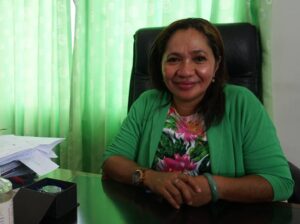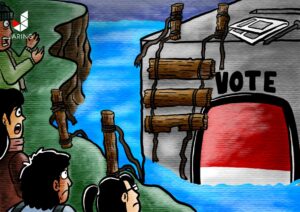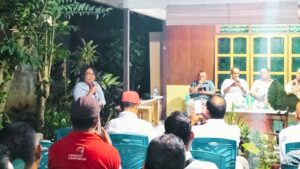
Three months after the regional elections were finalized on Dec. 9, 2020, the Sukabumi chapter of the General Elections Commission (KPU) in West Java is still keeping thousands of thermoguns, which it used to enforce COVID-19 health protocols during the voting day. The number amounts to a staggering 5,117 items!
The KPU Secretary General’s Decree on the grant procurement for state-owned properties, including the COVID-19 protocol enforcement tools during the voting day, issued on 2020, stipulated that these thermoguns, which belong to the government, was supposed to be distributed to all administrative regions on the voting day. After the democratic party was finished, the thermoguns were supposed to be returned to the KPU’s headquarters on Dec. 21, 2020, to be donated to those in need.
The chairman of the Sukabumi chapter of the KPU Ferry Gustaman said he was yet to be able to actually donate the equipment because he was still waiting for the inauguration of the elected regent. Ferry said he guaranteed that the equipment was used only once during the voting day, and that they were still in decent condition.
“They can still operate with no problems,” he said three days before the inauguration of the newly elected Sukabumi regent Marwan Hamami and his deputy Iyos Somantri, on Feb. 26, 2021.
Up until Monday, March 22, Jaring.id had attempted to contact Ferry several times to interview him about the donation procedures of all these health protocol equipments post-regional elections. Yet, Ferry did not respond to any phone calls or WhatsApp texts sent to him up to the publication of this article.
Meanwhile, about 594.3 kilometers away from Sukabumi, the Surakarta (also known as Solo) chapter of the KPU in Central Java turned out to move faster in distributing these thermoguns to the regional administrations to be donated to those who deserved them.
The Surakarta KPU commissioner Nurul Sutarti revealed she did not want to hoard state properties in her compound for too long.
“These thermoguns can still function properly. If any of these thermoguns became destroyed during the voting process, the KPU chapter had to write an object damage statement letter and replace them with new ones,” she told Jaring.id over the phone on Thursday, Feb. 2, 2021.
The Surakarta chapter of the KPU in Central Java finalized returning the 1,231 thermoguns. The number of thermoguns were exactly the same amount as the number of the voters there. The handover of the thermoguns was witnessed by former Solo mayor Fransiskus Xaverius Rudy Rudyatmo, then still in office, on Dec. 21, 2020.
“We have signed the handover document,” Nurul said.
The thermoguns donated by the KPU to the regional administration were just one of all the health protocol enforcement equipment (comprising: antiseptic liquids, hand washing basins with soaps available, face masks and hazmat suits) which were mandatory during the regional elections in early December 2020. This is according to the KPU’s Regulation No. 6/2020 on the regional elections amid the disaster of the COVID-19 pandemic.
To procure some of the personal protective equipment to facilitate the regional elections during the pandemic, the West Java KPU chapter had consolidated an open tender process for the organizers of the regional elections spread across various regencies in West Java, including: Karawang, Bandung, Cianjur and Indramayu throughout October 2020.
The KPU’s electronic procurement service set the budgetary cap to procure only 300.017, costing about Rp 159 billion (US$10.9 million) of these thermoguns for the elections throughout the region, with the estimated price charged by the supplier forecasted to be around Rp 139 billion.
Meanwhile, budget caps for the face mask and hazmat suit procurement were set at Rp 109 billion and Rp 53 billion, respectively. Out of the amount, the KPU estimated that the suppliers would change Rp 107 billion for face masks and Rp 48 billion for hazmat suits.
Delay in the procurement process
The KPU had a hard time finding the suppliers for these health protection equipment until less than a week before the voting day, which fell on Dec. 9, 2020. This resulted in a delay in the availability of the equipment.
In November 2020, this delay in health protection equipment distribution in several regions was recorded by the Indonesian Ombudsman. Out of the 31 regions (each represented by a KPU chapter) which organized the regional elections, about 72 percent of them (about 22) had not received the health protection equipment in the run-up to the voting day, according to Indonesian Ombudsman commissioner Adrianus Meliala.
“The central KPU did not distribute these equipment up until seven days before the voting day,” Adrianus told Jaring.id on Jan. 20. The delay narrowly misses the deadline set by the KPU through its letter No. 858 issued in 2020, which stipulated that these health protection equipment should be distributed during the final month of November 2020 or the first month of December 2020 at the latest.
Regional elections organizers in various regions, representing their own KPU chapters actually acknowledged the delay in the distribution of thermoguns, face masks and hazmat suits.
Nurul, for instance, said her institution could only start to distribute the health protection equipment all through the voting sites in Surakarta on Nov. 20, which explains the delay. She said that the difficulties faced by the national KPU in finding suppliers for these health equipment explained the lateness in its distribution on a regional level.
The problem with a centralized system
One of the core roots of the problem is centralization of the procurement process. The Surakarta chapter of the KPU had to rely on electronic catalogues (e-catalogues, part of the national-level tender process) to procure at least three health protection equipment types they needed for the voting day.
What does this have to do with centralization, which has resulted in the delay in the procurement process? The e-catalogue system is a centralized national procurement system which lists down the types, specifications and prices of goods and services for various public affairs, auctioned through the system where the suppliers can do their bidding. The problem is: the budget allocated for the procurement comes from the central government, managed by the local KPU chapters.
“The problem is: the specification of the health equipment comes from the central KPU,” Nurul said.
For that matter, the commissioner of the Balikpapan chapter of the KPU in East Kalimantan Noor Thoha said that the e-catalogue system should be decentralized so the local chapters of the KPU could adjust their own processes with their own local contexts.
He added that the centralized tender process had made the procurement process somewhat sluggish and inefficient.
“If the tender process is conducted on a national level, when will we receive these equipment? This is why elections-related procurement cannot be done in a centralized manner. If we keep on doing this, it is possible that in the future, we will only receive the items we need after we have done the voting process,” Noor illustrated, highlighting the inefficiency of such a centralized system.
In response to the complaints aired by the sources above, a KPU commissioner who specifically handles the 2020 regional elections’ logistics matters called Pramono Ubaid Tantowi said quite frankly that the problems were partly rooted in the double procurement system for the health equipment.
He said that despite the centralized nature of the procurement, each region still needed to consolidate its own tender process to make sure that the suppliers could cater to each individual region’s procurement process characteristics and challenges.
“During the pandemic crisis, the KPU chapters have no other choice but also procure the personal protection equipment. We are trying to facilitate the procurement in regions with zero experience in such procedures,” he explained.
Under its procurement scheme, the KPU has purchased about 13 types of health protection equipment, including 900,051 boxes of face masks, 300,017 units of thermoguns, 300,017 units of hazmat suits, 300,017 boxes of latex handgloves as well as 2,700,153 items of face shields. To supply the voting booths with hand sanitizing facilities, the KPU has also purchased 600.034 bottles of alcohol hand sanitizers, 600,034 bottles of site disinfectants, 600,034 bottles of liquid soaps, complemented with 300,017 units of sprayer bottles and 600,034 units of water containers. All these items are procured from suppliers selected through the tender process.
Meanwhile, other items such as 3,000,170 boxes of plastic handgloves for voters, 300,017 sheets of plastic bags as well as 900,051 boxes of tissue papers are procured using the local KPU’s budget, set by the national KPU. Some of these items, however, could not be provided during the elections day as some of the companies which had been appointed as suppliers withdrew from the process.
According to Pramono, these suppliers withdrew because they had overestimated their own production capacity and turned out not to be able to fulfill the quantity requested within the agreed-upon deadline. Anticipating this hurdle, his team decided to immediately terminate these suppliers’ contracts to find another as they were racing against time with the looming voting day ahead.
“KPU needed to make its decision rapidly; otherwise, the regional elections which we had slated to conduct on Dec. 9, 2020 had to be canceled,” Pramono briefed the press on an online conference disseminating the results of 2020 Simultaneous Elections Supervision Activities organized on March 5, 2021 by the National Commission on Human Rights.
In this case, Pramono said that the KPU did not violate any regulations in the 2020 Regional Elections health protection equipment procurement process. “We did not take the regulations lightly. We did not take actions outside the regulation. We did not make any underhanded deals. We thoroughly follow the KPU’s [anti-corruption] commitment,” Pramono said.
Pramono also denied rumors that the KPU procured some of the health protection equipment from China, violating the mandates that these items be bought from local suppliers.
“By communicating closely with the local suppliers and conducting some intense processes, Alhamdulillah (Praise be to God), these items could be available in the required quantity at least within a day before the voting day,” he said.
Yet, although he maintained that these items were purchased from local companies, he failed to name any local companies which acted as the KPU’s suppliers during the 2020 regional elections.
However, the KPU’s electronic procurement service system mentioned, among others, some of these suppliers’ names, including the suppliers of thermoguns: PT Cantika Putri Mandiri (with a total project value of Rp 114.5 billion), PT Tahta Djaga International (Rp 122.3 billion) and PT Sumber Alam Putra Lestari (Rp 50.02 billion).
Based on Jaring.id’s own investigation, the three companies were in actuality not qualified to procure health protection equipment, specifically thermoguns. Sector-wise, these companies actually work in construction and screen printing businesses.
Meanwhile, when we look at the providers of single-use face masks during the 2020 regional elections — PT Sumber Alam Putra Lestari (with project value of Rp 68 billion), PT Megatrade Sari Makmur (Rp 80.8 billion), PT Putra Nusa Abadi (Tp 93.1 billion) and PT Rajawali Nusindo (Rp 57.1 billion) — only one of them, namely PT Rajawali Nusindo, actually has an expertise in health equipment provision.
The fact that the health protection equipment is provided by companies which have no expertise whatsoever in manufacturing or distributing the items is in direct violation of the National Public Procurement Agency’s (LKPP) decree No. 13/2018 about emergency procurement, which requires the supplying companies to have an experience track record in procuring the items which are being solicited from them. Pramono further explained that the companies which turned out to fail in fulfilling the requests in quantity or quality would have their contracts terminated straight away.
Starting early March 2021, Jaring.id has tried several times to contact the three companies which had won the thermogun procurement tender mentioned above. Two companies: PT Chantika Putri Mandiri and PT Tahta Djaga International did not respond at all. Meanwhile, PT Sumber Alam Putra Lestari, which is registered as a screen printing company and won the procurement tender as the supplier of hazmat suits, thermoguns and latex handgloves, promised to contact Jaring.id.
A marketing officer from the company, identified only as Ari, texted briefly on March 9, 2021: “we will get back to you later”. Yet, up to this article’s publication date, the company which is located at a shop/house in Grand Puri Niaga, Kembangan, West Jakarta, has not come up with any responses regarding the tender process.
Criticism from watchdogs
Watchdogs are actually raising their eyebrows over the double procurement system for the health protection equipment in the 2020 regional elections.
Indonesian Corruption Watch (ICW) campaign division coordinator Siti Juliantari, the KPU owed the public explanation on the inefficient dual system.
“The e-catalogue procurement process is actually quicker, more time-efficient and more affordable. I think it’s better to use the e-catalogue procurement system [for future elections]. The tender process [is inefficient and costly] since it involves bidding, checking and lots of other procedures,” she told Jaring.id on Feb. 24, 2021. She added that using both systems simultaneously was even more inefficient and costly.
Apparently, ICW also discovered another oddity with the procurement process: that the general procurement code, specifically for the procurement of the single-use face mask with the tender code of 8056724 had been missing.
Additionally, the general procurement code for the latex handgloves, with a price cap of Rp 3.2 billion, had also gone missing.
These are glaring incidences, considering that Law No. 18/2018 on the procurement of goods and services stipulated that all budget recipients have to announce their general procurement code through an electronic system to make supervision easier.
“The general procurement code is supposed to be announced through a general procurement information system by the time the timeline for the budget spending has been finalized,” Tari said. She added that the system was in place to ensure healthy competition among the suppliers.
“When the general procurement codes are not being publicized, this can spark speculations among people, who might assume that the suppliers are trying to conceal their mishaps. Unfortunately, we procure the objects without having the information system in place, first and foremost,” she added.
Fajar Adi Hernawan from the LKPP echoed Tari’s notions. In short, according to Fajar, governmental institutions need to pay attention to whether the procurement system in its entirety has been effective and efficient, with proven accountability even during emergency situations. With this in mind, he also questioned the highly inefficient dual procurement system, when such duality was not really necessary.







